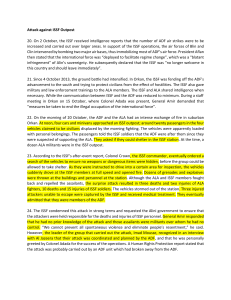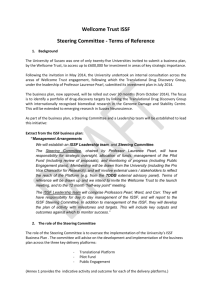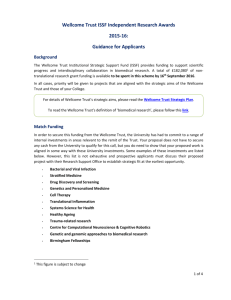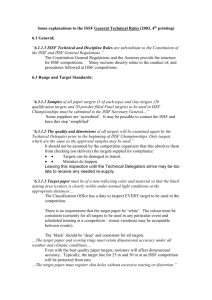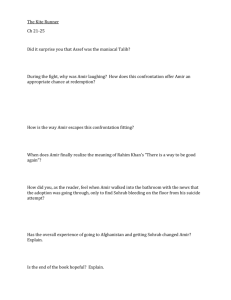Moot Problem - New Zealand Red Cross
advertisement
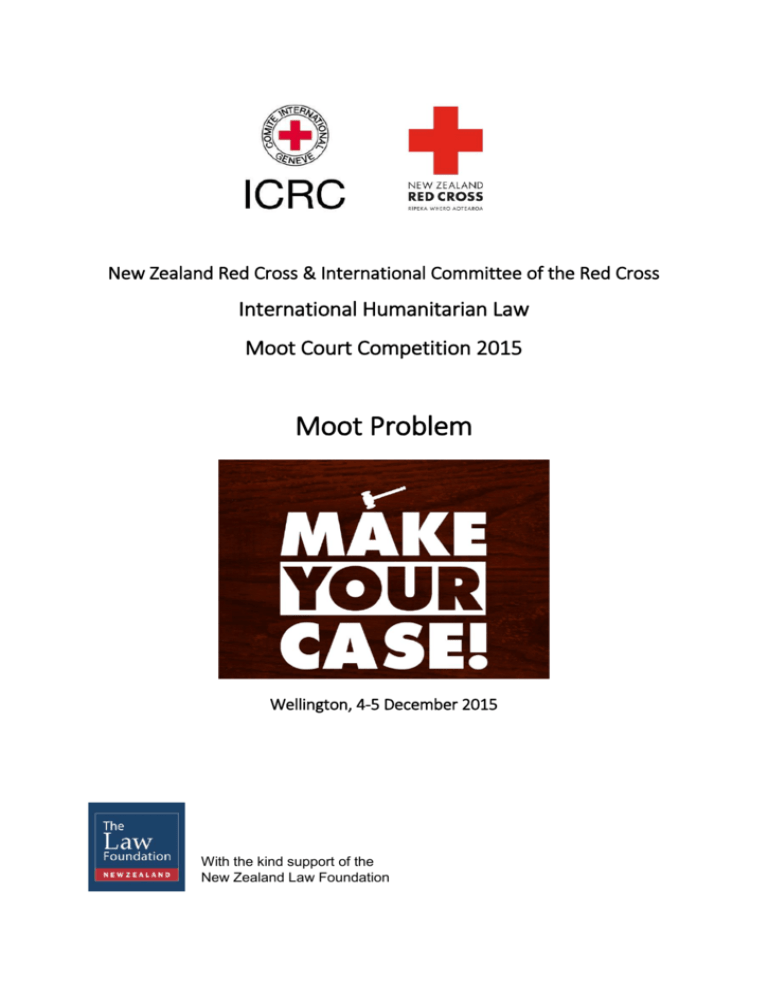
New Zealand Red Cross & International Committee of the Red Cross International Humanitarian Law Moot Court Competition 2015 Moot Problem Wellington, 4-5 December 2015 With the kind support of the New Zealand Law Foundation PROSECUTOR V. HASSAN AMIR BEFORE THE INTERNATIONAL CRIMINAL COURT AT THE HAGUE INSTRUCTIONS 1. The hearing takes place pursuant to Article 61 of the ICC Statute (confirmation of charges). At this stage, the Prosecutor has to “support each charge with sufficient evidence to establish substantial grounds to believe that the person committed the crime charged.” 2. The case is entirely fictional. Teams should confine themselves to the facts supplied. Neither the Prosecution nor the Defence may introduce new facts. The Moot Problem includes all the facts supported by the evidence that has been presented before the Court. Teams may nonetheless draw reasonable inferences from the evidence produced. They may also question the credibility or weight of the evidence. 3. Teams should not hand anything to judges unless asked to by a judge. 4. The problem is not intended to raise questions of procedure before the ICC. Procedural questions should be ignored. 5. The problem is not intended to raise questions relating to the jurisdiction of the ICC. The jurisdiction of the ICC should be assumed. Counsel may address issues regarding the admissibility of the case under article 17 of the Statute of the ICC (“Statute”) if relevant. 6. Applicable law: In accordance with Article 21 of the ICC Statute, the Court shall apply (a) In the first place, this Statute, Elements of Crimes and its Rules of Procedure and Evidence; (b) In the second place, where appropriate, applicable treaties and the principles and rules of international law, including the established principles of the international law of armed conflict; (c) Failing that, general principles of law derived by the Court from national laws of legal systems of the world including, as appropriate, the national laws of States that would normally exercise jurisdiction over the crime, provided that those principles are not inconsistent with this Statute and with international law and internationally recognized norms and standards. The Court may apply principles and the rules of law as interpreted in its previous decisions. [2] Background 1. Yousef Aflan, leader of the ruling Revolutionary Party, was elected as President of the Republic of Alin in 2000 and has been in power since then. A close political ally, General Hassan Amir, has been heading the Alin Defence Forces (ADF) since 1995. 2. Over the last decade, corruption, abuse of power, arbitrary arrests and stringent restrictions on political activity and freedom of expression have become prevalent under the Aflan regime. The population have become increasingly disillusioned with the Revolutionary Party and the President. 3. Following weeks of social unrest, an estimated 5,000 protesters turned up at Liberation Square in Orkanville, the second largest city, in Alin’s Orkan region, on 15 January 2013. Protesters chanted anti-government slogans and called for the immediate resignation of President Yousef Aflan. In an effort to disperse the crowd, security forces killed twenty protesters and scores of them were injured. 4. On the following day, the government of Alin decided to impose censorship on the internet in the wake of increasing criticisms from the people about the economic and social policies of the Revolutionary Party. Resentment among the Alini population, especially among the younger generation, surged after the internet censorship was imposed. 5. On 15 March 2013, a group of militants, unknown to the public until then, attacked the police and security forces in the southern part of Orkanville and took control of a local administrative council. Colonel Aziz Nur, leader of this self-proclaimed “Alin Liberation Army” (ALA), announced in the media that the ALA was “a voluntary force striving for a free Alin through armed struggle”. Colonel Nur called for the resignation of President Yousef Aflan and a national election. 6. The government immediately denounced the ALA as “terrorists”. In the following days, President Aflan, in consultation with General Amir, decided to launch an offensive to neutralize the ALA, as the group was rapidly expanding its control over several towns in the southern part of the country. The ADF commander in Orkan, Colonel Adada reported to General Amir and took instructions from him directly. Colonel Adada was a popular figure among his own forces, who swore loyalty to Adada and claimed to only answer to him. Demonstrations and Crackdown in North Orkan 7. As the ADF was moving to regain control of the southern part of Orkanville, the Aflan government declared martial law in Orkanville and its suburbs. Towards the beginning of June 2013, local activists calling themselves the ‘Orkan Freedom Group’, sympathetic to the ALA but not the use of violence, were planning a demonstration march to the Town Hall in the northern part of Orkanville, where the main government administration was located. The march was coordinated by supporters through various social media channels. Its objective was to protest against the ruling government and occupy the Town Hall. 8. General Amir, Colonel Adada and other senior local military staff had a meeting on 10 June 2013 at the Town Hall. A military officer present at this meeting recalled that, invoking its powers under the martial law, General Amir prohibited the protest march and instructed the ADF to take any necessary measures to prevent it. Another military [3] officer recounted some disagreement between Amir and Adada over the operational strategy to prevent the gathering. 9. On the morning of 13 June 2013, around 2,000 residents gathered to demonstrate and march towards the Town Hall. They encountered ADF obstructions not long after they started, but kept marching on. As the demonstrators were approaching the Town Hall, the ADF used tear gas and plastic bullets to disperse the crowd. Some armed demonstrators then attacked the ADF soldiers with concealed firearms, killing two and wounding several others. Six persons were killed by ADF soldiers using live ammunition. At noon, the demonstration was dispelled and more than 150 demonstrators were arrested. However, about 200 demonstrators succeeded in occupying another building in the vicinity – the National Technical College (NTC). 10. Later that day, the ADF actively searched the neighbourhood close to the Town Hall, arresting demonstrators. At around midnight, an ADF unit entered the NTC building to carry out a search which lead to acts of violence. A demonstrator testified later that she was taken with several other women to the basement of the building where they were raped repeatedly before being transferred to a detention facility operated by the Ministry of Security. She was eventually released on 17 June 2013. Two other women described in detail how they were arrested outside the NTC on 13 June 2013, taken to the detention facility to be interrogated, and raped there by soldiers before being let go the following morning. 11. On 14 June 2013, General Amir told Colonel Adada: “We should always stay vigilant in the fight against terrorists. We should be pro-active.” According to ‘Human Rights Protection’, an activist NGO operating internationally, the week following the demonstration, the ADF raided a number of homes and arrested persons suspected of participation in the demonstration or of supporting the ALA. Human Rights Protection estimated that several women were victims of sexual violence, including rape and the threat of rape. Al Jazeera and BBC also reported incidents of sexual assaults on local residents perpetrated by pro-government militants. Deployment of the International Security Support Force (ISSF) 12. Since April 2013, following the launch of the offensive in the south of the country, the Air Defence Force have been bombing alleged ALA bases, including some residential areas where ALA militants were suspected to be. The resulting civilian casualties were reported by international media and condemned by the UN Secretary-General. The humanitarian situation in Alin rapidly drew the attention of the international community with large numbers of persons leaving their home to take refuge outside the bombarded towns. On 10 July 2013, the UN Secretary-General called on all parties in Alin to exercise restraint in the use of force and warned of an impending “humanitarian crisis”. On 20 July, the UN Security Council adopted Resolution X, part of which stated as follows: The Security Council, acting under Chapter VII of the Charter of the United Nations, 1. Demands an immediate cease-fire and a complete end to violence and all attacks against, and abuses of, civilians; 2. Demands that the Alini authorities comply with their obligations under international law, including international humanitarian law, human rights, and to ensure the rapid and unimpeded passage of humanitarian assistance; [4] 3. Authorizes the establishment of an International Security Support Force (ISSF) to protect civilians and civilian populated areas under threat of attack in Alin, and to maintain security; 4. Authorizes the Member States participating in the International Security Support Force to take all necessary measures to fulfil its mandate; … 13. On 21 July 2013, President Aflan announced that the government would comply with Resolution X and implement a ceasefire and, on 1 August, agreed to the deployment of the ISSF in Alin. The ISSF arrived in Alin on 1 September and established its main base in Astor, a city at the edge of the north/south divide of the country. The ISSF consisted of a Military Observers Unit (MOU), a Civilian Police Unit (CPU) and a Protection Force Unit (PFU). The CPU (composed of 80 police officers) was mandated to maintain public security and were armed with light weapons. The PFU (composed of 400 military personnel) had the specific tasks of protecting the civilian population and ISSF non-military personnel. Blin and Clin, two neighbouring countries, and seven other countries, contributed to all ISSF components. 14. Within two weeks following the ISSF’s arrival, the fighting between the ALA and the ADF resumed. The PFU had several violent confrontations with ADF units as the latter were firing at areas where civilians were concentrated in their attempts to regain control over two towns in the region. Some media reported, based on unnamed sources within the Alin government, that the relations between General Amir and Colonel Adada were increasingly frictional and acrimonious. Attack against ISSF Compound 15. On the morning of 15 September 2013, two ADF fighter jets attacked suspected ALA bases in civilian areas near the ISSF compound in Astor. ISSF immediately requested General Amir to cease the attack after shells landed on civilian buildings, but the demand went unheeded. Subsequently, ISSF anti-aircraft machineguns fired at the fighter jets from the ISSF compound. The air raid was discontinued in the afternoon. 16. After sunset the same day, a group of around one hundred armed assailants attacked the ISSF base, killing eight ISSF personnel, and wounding twenty; the PFU sustained most of the casualties. The fighting lasted for a few hours until the group left. 17. "We were just preparing for dinner when the first rocket hit us," one ISSF soldier told the press hours after the attack. Many ISSF soldiers said they were able to identify the assailants as belonging to the ADF. Colonel Adada was spotted by some outside the compound during the attack. ISSF personnel said the assailants used heavy weaponry, including rocket-propelled grenades. 18. The rocket-propelled grenades left craters in the ground and damaged some property. Prefabricated houses that served as the administration headquarters for the base were riddled with bullet holes. 19. The ADF and ALA initially blamed each other for the attack. President Aflan later accused the ISSF of siding with the ALA. On 20 September 2013, General Amir met with Colonel Adada to discuss the ongoing military operations. International media reported that Amir had been in the region for a few days, supervising ADF operations. [5] Attack against ISSF Outpost 20. On 2 October, the ISSF received intelligence reports that the number of ADF air strikes were to be increased and carried out over larger areas. In support of the ISSF operations, the air forces of Blin and Clin intervened by bombing two major air bases, thus immobilizing most of ADF’s air force. President Aflan then stated that the international force was “deployed to facilitate regime change”, which was a “blatant infringement” of Alin’s sovereignty. He subsequently declared that the ISSF was “no longer welcome in this country and should leave immediately”. 21. Since 4 October 2013, the ground battle had intensified. In Orkan, the ISSF was fending off the ADF’s advancement to the south and trying to protect civilians from the effect of hostilities. The ISSF also gave military and law enforcement trainings to the ALA members. The ISSF and ALA shared intelligence when necessary. While the communication between ISSF and the ADF was reduced to minimum. During an ADF staff meeting in Orkanville on 15 October, where Colonel Adada was present, General Amir demanded that “measures be taken to end the illegal occupation of the international force”. 22. On the morning of 20 October, the ADF and the ALA had an intense exchange of fire in suburban Orkan. At noon, four cars and minivans approached an ISSF outpost; around twenty passengers in the four vehicles claimed to be civilians displaced by the morning fighting. The vehicles were apparently loaded with personal belongings. The passengers told the ISSF soldiers that the ADF were after them since they were suspected of supporting the ALA. They asked if they could shelter in the ISSF station. At the time, a dozen ALA militants were in the ISSF outpost. 23. According to the ISSF’s after-event report, Colonel Crown, the ISSF commander, eventually ordered a search of the vehicles to ensure no weapons or dangerous items were hidden, before the group could be allowed to take shelter. When they were instructed to drive into a certain area for inspection, the vehicles suddenly drove at the ISSF members at full speed and opened fire. Dozens of grenades and explosives were thrown at the buildings and personnel at the station. Although the ALA and ISSF members fought back and repelled the assailants, the surprise attack resulted in three deaths and two injuries of ALA fighters, 10 deaths and 15 injuries of ISSF soldiers. The vehicles stormed out of the station. Three injured attackers unable to escape were captured by the ISSF and received medical treatment. They eventually admitted that they were members of the ADF. 24. The ISSF condemned this attack in strong terms and requested the Alin government to ensure that the attackers were held responsible for the deaths and injuries of ISSF personnel. General Amir responded that he had no prior knowledge of the attack and those assailants were militants over whom he had no control. “We cannot prevent all spontaneous violence and eliminate people’s resentment,” he said. However, the leader of the group that carried out the attack, Imad Mousse, recognized in an interview with Al Jazeera that their attack was coordinated and planned by the ADF, and that he was personally commended by Colonel Adada for the success of the operations. A Human Rights Protection report stated that the attack was probably carried out by an ADF unit which had broken away from the ADF. [6] End of Hostilities 25. The international community condemned General Amir and the government of Alin over the “despicable” attack against the ISSF outpost in suburban Orkan, and increased its material support for the ISSF. Meanwhile, the Aflan government’s legitimacy was increasingly challenged domestically. On 6 December 2013, President Aflan stepped down. Upon the end of hostilities between the parties, a new election was held with the assistance from the ISSF. Aziz Nur, the ALA leader, was elected President of Alin. With the reshuffles in the military structure and change of political climate, General Amir was no longer able to hold his post. Victims of the past conflict in Alin requested proper investigation and those responsible be punished. 26. On 15 May 2014, Alin referred the situation in its territory from March to December 2013 to the International Criminal Court (ICC). On 20 August 2014, General Amir was surrendered by Alin to the ICC pursuant to a request of the Court. 27. Pre-trial Chamber I of the ICC is going to decide whether to confirm the following three charges put forward by the Prosecutor against Hassan Amir: Count One – With respect to the incidents against civilians taking place in north Orkanville in June 2013, on the basis of command responsibility (Article 28 (a)): the war crime of rape under Article 8(2)(e)(vi) of the Rome Statute. Count Two – With respect to the attack against the ISSF compound on 15 September 2013, on the basis of individual criminal responsibility for committing, whether as an individual, jointly with another or through another person (Article 25 (3)(a)): the war crime of intentionally directing attacks against personnel, installations, material, units or vehicles involved in a peacekeeping mission in accordance with the Charter of the United Nations, as long as they are entitled to the protection given to civilians or civilian objects under the international law of armed conflict under Article 8(2)(e)(iii) of the Rome Statute. Count Three – With respect to the attack against ISSF outpost in suburban Orkan on 20 October 2013, on the basis of individual criminal responsibility for ordering, soliciting or inducing (Article 25 (3)(b)): the war crime of killing or wounding treacherously individuals belonging to the hostile nation or army under Article 8(2)(b)(xi); or the war crime of killing or wounding treacherously a combatant adversary under Article 8(2)(e)(ix) of the Rome Statute. [7] Note: All States involved, including States participating in ISSF, were parties to the following treaties at the relevant time: - Four Geneva Conventions of 1949 Additional Protocols I and II of 1977, to the Geneva Conventions of 12 August 1949 Charter of the United Nations Statute of the International Criminal Court Convention on the Safety of United Nations and Associated Personnel Preparation of the Memorials In preparing the memorials, the counsel for Prosecution and Defence are expected to establish the following points: - - The type (s) of armed conflict or other situation of violence and the law that is applicable to the present case; The elements of crimes for each of the three counts against General Amir that have to be established by the Prosecution for the suspect to be convicted and the burden of proof; Applicable law and policy and supporting authorities. Questions relating to jurisdiction of the ICC need not be raised unless they are linked to the substance or the merits of the case. [8]
